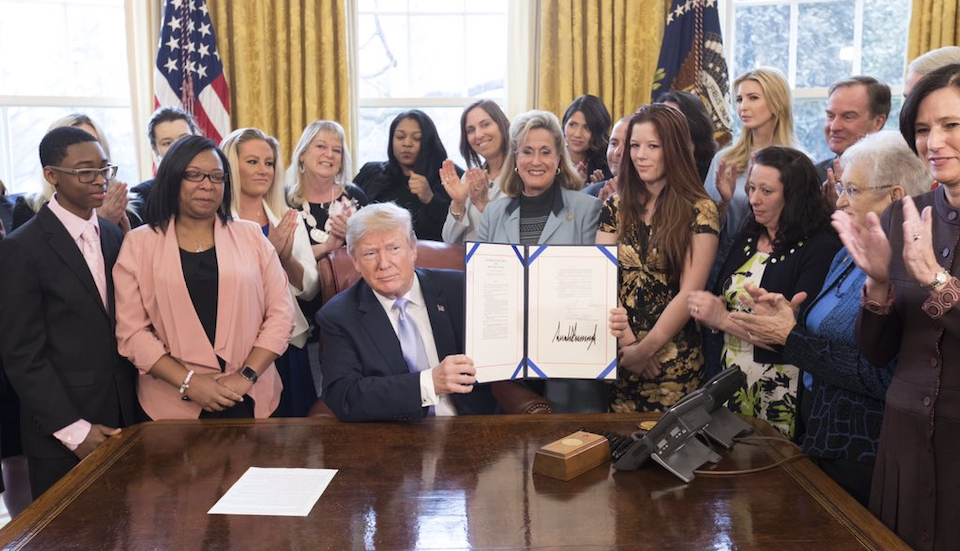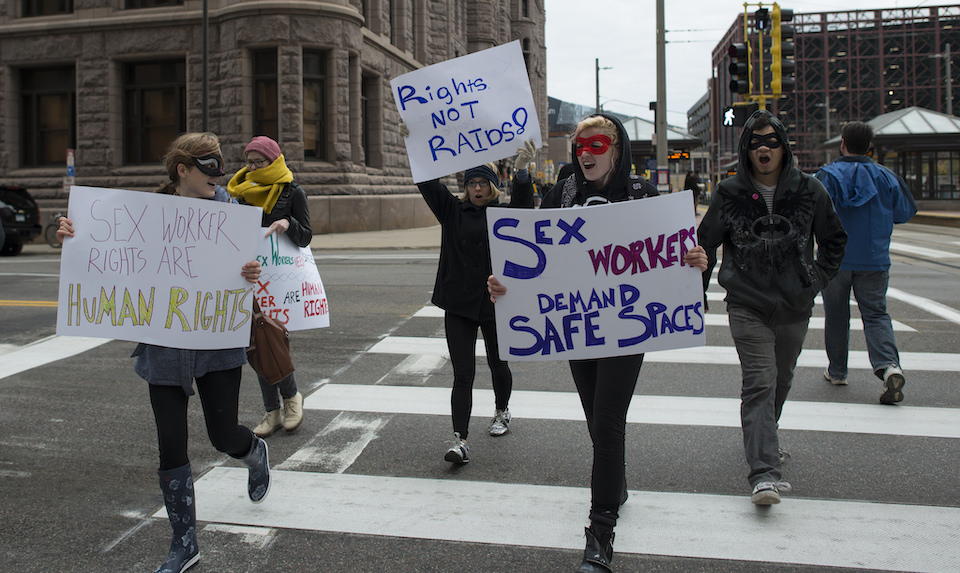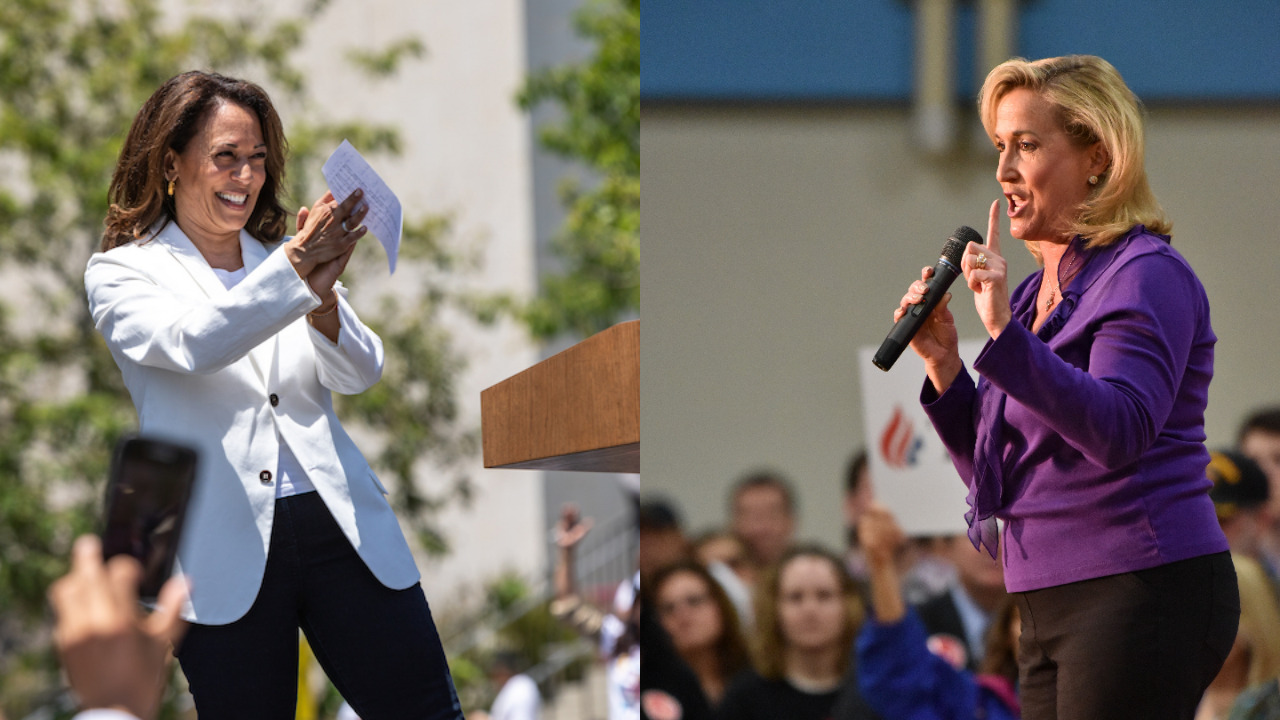“Have you heard? Kamala Harris is in favor of decriminalizing sex work.”
Chances are that if you have anything to do with the adult industry or other kinds of sex work, you probably heard a version of that statement over the last few weeks. Even the mainstream press has jumped into the conversation with a variety of think pieces and op-eds, making it one of the main talking points about Harris’ presidential campaign.
But if Harris thought her endorsement of “decriminalization" (we’ll get to the quotation marks in a second) would spark joy among sex workers, her alleged “evolution” on the issue was largely unconvincing.
Many performers and other adult industry professionals have not embraced the news the way Harris and her team might have expected. Both in person and via social media, many people have responded with variations of “Don’t trust her” and “Once a cop, always a cop” (Harris is a career prosecutor who served as San Francisco DA and Attorney General of California).
Why, then, won’t sex workers embrace Harris’ historic statement, possibly the first for a serious presidential contender?
The answers to that question go to the heart of the complicated relationship between sex work and mainstream politics in 2019. They also transcend Harris.
Their implications concern the way almost all politicians and the mainstream press commonly talk about non-traditional sexual arrangements between consenting adults.
What Did Kamala Harris Say About Her Position on Sex Work?
The “decriminalization” remarks were part of a video interview Harris gave The Root, a news site covering politics and culture from African-American perspectives, which was published Feb. 26.
The Root’s interview with Harris was explicitly aimed at black voters, as Senior Reporter Terrell Jermain Starr, who conducted the interview, pointed out. Presented as an installment of their “Eyes on 2020” series, it was meant to re-introduce the California Senator to black voters as a strong presidential candidate.
The whole interview is 20 minutes long. The entire section where Harris is asked about sex work takes less than three minutes, between 14:40 and 17:17.
Because her words on the matter are particularly slippery, even for a politician, we have transcribed it in its entirety, adding emphasis on the problematic sections:
Interviewer: Recently you supported FOSTA. There are many sex workers who feel that that law was insensitive to their lives. What is your response to that?
Harris: Well you should know my history on the issue. I mean back when I was DA, and remember I was elected DA over 15 years ago, actually, I took office in 2004 and I was advocating then that we had to stop arresting these prostitutes and instead go after the johns [pause] and the pimps. Because we were criminalizing the women, but not the men who associated with it, and [made] money off of it and profiting off of it.
I started, even before I was elected DA, so this would have been 2000, 2002, a whole coalition that was focused on what I call “sexually exploited youth,” which other people were calling “teenage prostitutes” because the system was arrresting these young people instead of understanding that they needed to be in a safe place, so we advocated for “safe houses” instead of incarceration of these young people. So this is my history on the issue.
In terms of Backpage, similarly [sic]. Backpage was providing advertisement for the sale of children, of minors. And unlike Craigslist, which said “We’re gonna stop doing it,” the people who are running Backpage basically thumbed their nose at us, and [kept] doing it, making money off of the sale [pause] of youth. And so I called for them to be shut down. And I have no regrets about that.
Now, on the issue of providing a safe place for sex workers, I’m a huge advocate for that, always have been.
Interviewer: Do you think that sex work ought to be decriminalized?
Harris: I think so [nods]. I do. I think that we have to understand, though, that it is not as simple as that. It is also about a … there is a … there is an ecosystem around that, that includes crimes that harm people, and for those issues I do not believe that anybody who hurts another human being, or profits off of their exploitation should be admonished … or should be free of criminal prosecution. But when you’re talking about consenting adults, I think that, you know — yes, we should really consider that we can’t criminalize consensual behavior, as long as no one is being harmed. But at the point that anyone is being harmed or exploited, I think we have to understand that’s a different matter.
That is it. That is the entire section of the video concerning sex work.
The Root’s headline for their piece may have something to do with the publicity garnered by this brief exchange and Harris’ supposed “about-face” about decriminalization. The Root posted the interview as “Exclusive: Kamala Harris Calls for Decriminalization of Sex Work, Unequivocally Calls Trump a Racist and Wants Reparations (Sort of).”

A Closer Look at Kamala Harris' "Sex Work" Interview
Let’s review Harris’ problematic statements in detail:
"My history on the issue": the interviewer pointedly asked Harris to give a response to the many sex workers who were directly affected by FOSTA-SESTA. He was referring to the infamous legislation package that was overwhelmingly supported by congresspeople of both parties, including many who consider themselves, like Harris, liberal or progressive.
(For XBIZ's ongoing coverage of FOSTA-SESTA, click here.)
Instead of speaking about FOSTA-SESTA and its impact on sex workers, who almost universally opposed it, offering eloquent explanations of how it would affect them, Harris shifted the answer to her “history on the issue.”
But the “issue” she chose to talk about was actually two related issues. First, she spoke about some work she did years ago in the Bay Area on outreach and rescue of young people allegedly pressed into sex labor. The second issue was her extremely controversial 2016 prosecution of the owners of classifieds website Backpage.
Harris never actually answered the original question, about her support for FOSTA-SESTA and the sex workers' questions.
"I was advocating then that we had to stop arresting these prostitutes and instead go after the johns [pause] and the pimps": This is the clearest indication of Harris’ current position on sex work, and unsurprisingly, it refutes The Root’s headline and the following mainstream media attention.
Harris, turns out, is not actually in favor of what the sex work community understands as decriminalization.
Harris’ conflation of “the johns” (a tellingly outdated word for men who pay for sexual services) and “the pimps” is a classic strategy of both outright prohibitionists and the supporters of the “Nordic Model” of sex work. The Nordic Model, roughly speaking, decriminalizes the selling of sexual services but ramps up the penalties and enforcement focus both for a third-party profiting off of the sex worker (“pimping”) and, crucially, the buying of sexual services.
The Nordic Model, popular with liberal women, progressive Christians and SWERFs (Sex Worker Exclusive Radical Feminists) alike, is really a variation of “don’t hate the sinner, hate the sin.” Its alleged goals are to end prostitution in all forms and “rescue” sex workers, whom it considers as invariably exploited — by pimps, by society, by the patriarchy or by their own subconscious.
In practice, the invariable effect of the Nordic Model is the driving of sex work underground, keeping the activity of buying such services illegal, and forcing sex workers to operate in a shadowy, hazardous environment.
If Harris actually supported decriminalization, she would not be speaking of prosecuting “the johns,” whom she mentions before “the pimps.”
"We were criminalizing the women, but not the men who associated with it, and [made] money off of it and profiting off of it": Again, Harris sees sex work as a single, simplistic thing involving three parties: an unwilling woman, a man profiting from her labor, and another man who is also “associated with it.” Both men, in Harris' scenario, need to be arrested and incarcerated.
In her characterization, the exploited women are below the age of consent. No part of this statement applies to those sex workers who are consenting adults.
The other consistent element of Harris’ sex work narrative is rescue. Since she sees sex workers exclusively as unwilling, she obviously thinks it’s her duty to save them from their “abusers” and to re-incorporate them into society as non-sex-workers.
"Backpage was providing advertisement for the sale of children, of minors": After presenting her reductive view of sex work, Harris then moves on to one of her go-to stories that paint her as a tough prosecutor who saved the lives of the innocent: her 2016 prosecution of Backpage’s owners Mike Lacey, Jim Larkin and the site’s CEO Carl Ferrer.
Since 2016, Harris has been repeating the same story about Backpage. She claimed that the classifieds site, which was useful to many sex workers for offering services and screening clients, and even to law enforcement for monitoring pimping and trafficking, had to be completely shut down. Harris referred to Backpage as "an online brothel," and she wanted it shuttered for good.
Harris constantly implies that the "sale of children" was the site's main business model. The government, however, eventually only prosecuted six specific instances of facilitating the prostitution of a minor among the enormous volume of ads posted on Backpage by third-party sex providers over a period of several years.
Throughout the case, Harris teamed up with socially conservative Republicans, who were at the same time trying to push for restrictive legislation to police the internet, under a "fighting human trafficking" agenda.
Harris' crusade against Backpage and her support for FOSTA are not separate issues. To understand how they are connected and why this is crucial to sex workers, it might be helpful to look a bit closer at the history behind them.

A Short History of the Backpage Case
In October 2016, while serving as California Attorney General, the allegedly liberal Democrat Harris teamed up with Tea Party Republican Ken Paxton, her Texan counterpart, to announce, with much fanfare, a raid of the Dallas headquarters of Backpage and Ferrer’s arrest in Houston.
Harris charged Ferrer with facilitating a connection between sex workers and clients (i.e., “pimping”), conspiracy and a separate charge of pimping minors. Harris also charged Lacey and Larkin with conspiracy.
Many sex workers, realizing that Harris was intending to shut down all of Backpage's adult classifieds, organized protests against the arrests. They eloquently argued that shutting down Backpage would harm their lives and livelihoods, but Harris ignored her critics.
Harris' crusade was not new. Between 2011 and 2016, a number of legal challenges had been presented against Backpage, aiming to shut down the entire website on the grounds that it was used to advertise sex work in general.
Backpage managed to fend them off by invoking Section 230 of the Communications Decency Act of 1996, which was designed to target the people posting illegal ads (for non-consensual offers of sex work) but not the internet service providers.
A month later, a judge of the Superior Court of California granted Backpage’s request for dismissal. In December 2016, the charges were dismissed on the grounds that Section 230 was pretty clear and that Congress was responsible for changing it before Backpage could be prosecuted.
In December 2016 and January 2017, Harris filed new charges against Lacy, Larkin and Ferrer related to pimping and money laundering, including charging Ferrer with knowingly “pimping” six “minors.”
The new charges coincided with the publication of a congressional report called “Backpage.com Known Facilitiation of Online Sex Trafficking.” The issuing committee was chaired by Rob Portman, a Republican from Ohio, who had just run his successful 2016 re-election campaign largely based on the issues of “human trafficking and opiod addiction.”
Harris and Portman are usually on opposite sides on social issues. Portman’s voting record and statements show him as anti-choice, opposing the Affordable Care Act, consistently conflating sex work with “human slavery,” and, until his son came out as gay in 2011, invariably anti-LGTBQ rights.
Following the committee’s January 2017 report, released to much publicity in the chaotic period between the 2016 election and the inauguration, Backpage was pressured into voluntarily removing all its “adult” sections, which had been used to offer all manner of arrangements between consenting adults.

Congress was, in fact, considering changes to Section 230. Ann Wagner, an extremely conservative Missouri Republican in the House, had introduced a bill she called the Allow States and Victims to Fight Online Sex Trafficking Act (FOSTA).
Wagner is a lifelong anti-choice activist who consistently conflates consensual sex work with “trafficking.” Wagner was an ardent anti-Trump Ted Cruz supporter until close to the 2016 election, when she announced she was supporting Trump.
FOSTA was combined with a similar project in the Senate, the Stop Enabling Sex Traffickers Act (SESTA), and the combined FOSTA-SESTA package passed the Senate in March 2018 and was signed into law by Donald Trump in April 2018.
(Read "H.R.1865 - Allow States and Victims to Fight Online Sex Trafficking Act of 2017" here.)
In a rare display of bipartisanship, 27 Democratic and Republican senators, including Harris, introduced SESTA. It sailed through the House on a 388-25 vote, even after the Department of Justice explained that the law would make it more difficult to catch actual human traffickers.
The Senate passed it 97-2. The only holdouts were Libertarian Rand Paul (R-KY) and Left Liberal Ron Wyden (D-OR).
In April 2018, the FBI seized Backpage and raided Lacey’s home, charging him with money laundering. Ferrer cut a deal to plead guilty to conspiracy to facilitate prostitution and money laundering, in exchange for testifying against his former partners.
“For far too long, Backpage.com existed as the dominant marketplace for illicit commercial sex, a place where sex traffickers frequently advertised children and adults alike,” then Attorney General Jeff Sessions said at the time.
Like Harris, the Trump administration also deliberately blurred the lines between consensual and non-consensual sex work, and also between consenting adults and minors.
Harris’ court victories and the GOP-controlled congressional investigations leading to FOSTA-SESTA were exclusively promoted as saving “children” and fighting “human trafficking.” Almost no mention was made of consensual and adult sex work, which was the cornerstone of Backpage’s business model and the actual target of the legal and congressional developments.
Sex workers condemned the shuttering of Backpage, arguing that it offered them a safer alternative to other places and platforms to offer their services.
This is the context of Harris’ characterization of Backpage as a marketplace selling children and “youth” itself.
Harris’ relentless prosecution of the Backpage owners, and her dismantling of the main online marketplace for sexual services, has made her a supposedly bipartisan figurehead for supporters of FOSTA-SESTA, a piece of legislation that originated with Midwest politicians from Deep Red districts like Anne Wagner and Rob Portman, who are far to the right of center in social issues.
What Did Kamala Harris Mean by “Decriminalization”?
"Do you think that sex work ought to be decriminalized?” “I think so [nods]. I do”: We finally get to the exchange that launched a thousand tweets.
It is Starr, and not Harris, who speaks the word “decriminalized,” but the Senator’s response is theatrically deliberate and it comes off as well-rehearsed. It would not be surprising that the exchange was negotiated in advance and that Harris intended all along to be quoted as having evolved in her position on sex work.
It is entirely possible that she does not really understand the difference between the harm-reducing, sex-worker-endorsed decriminalization position and the customer-jailing compromise known as the “Nordic Model."
"There is an ecosystem around that": Here is where it gets really tricky to parse Harris’ actual position. Her venomous characterization of Backpage as nothing but a marketplace of abused children shows that she thinks that the promotion and increased visibility of legitimate sex work is part of a terrible ecosystem, separate from mainstream society and needing to be policed. Turns out the people who claim “Kamala: once a cop always a cop” might be onto something. Her worldview on sex work, consensual or otherwise, is that of a vice detective right out of “Law & Order: SVU.”

How Can Kamala Harris Begin to Gain the Trust of Sex Workers?
Sex workers have never been one thing. Sex workers in the U.S. can be women or men, cis or trans, anywhere on the LGBTQ spectrum, independent or represented, working with the knowledge and support of their families or not, extremely discreet or loud, dominant or submissive, kinky or vanilla, slim or curvy, proud about sex work as a vocation or just doing it for the money, like most Americans.
To emphasize a singular sex worker stereotype, "pimps and johns" out of a 1970s drive-in movie, and then to attempt to regulate the sexual activities of consenting adults based on that single narrative, is to silence the voices of every sex worker who does not conform to it.
The political class and much of mainstream press often assume we live in a fictional America in which most adults are (or aspire to be) in monogamous, middle-class, nuclear family arrangements. Consenting adults in 2019 make all kinds of arrangements regarding sex, money and work that do not conform to those assumptions.
Harris’ stories of malevolent street pimps and “sexually exploited youth” don’t differentiate between men who pay for sex and criminals who abuse women. In her telling, she’s on the side of “decent folk,” who keep sex, money and work in uncomplicated, separate spheres.
Though Harris implies she is one of these uncomplicated people, we now know that she had at least one "it's complicated" arrangement in the mid-1990s when she “dated” a powerful married man who also happened to appoint her to the positions that would launch her political career.
Sex workers, always among society’s natural-born-survivors, are wise not to trust Kamala Harris, or any politician who refuses to listen to them seriously. Instead of giving confusing pre-negotiated interviews to charm an unrealistically defined (and quickly dwindling) “decent folk” middle-class, Harris and her team should instead arrange for a listening session with a truly diverse group of sex workers and advocates.
An honest, fact-based dialogue about sex work is the only remedy for the dangerous, life-threatening hypocrisy of the political class.
Gustavo Turner is the News Editor at XBIZ. Twitter: @GustavoXBIZ







